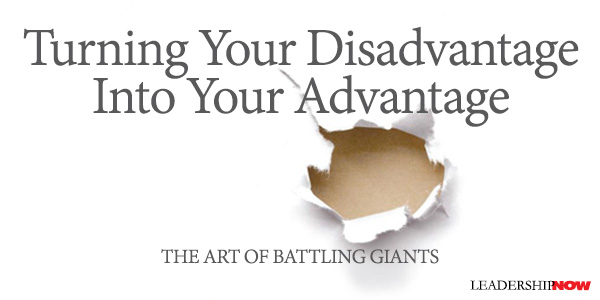 |
 |
10.13.13

Turning Your Disadvantage Into Your Advantage
MALCOM GLADWELL wants us to rethink how we think about the giants in our lives whether they be outsized opponents, disabilities, misfortunes, or oppression. We all face or have faced odds that seemed to be stacked against us. Odds that we are forced to deal with. In David and Goliath, Gladwell shares two ideas. First, “much of what we consider valuable in our world arises out of these kinds of lopsided conflicts, because the act of facing overwhelming odds produces greatness and beauty.” The battle makes us better. It develops us and reveals strengths that we didn’t know we had.Second, giants are not always what we think they are. The powerful and strong are not always what they seem. Often their strength can expose their greatest vulnerability. Their size can be their undoing. What we see as their overwhelming advantages can also be the thing that limits their options. We know but easily forget, that there is a point where more doesn’t make a difference and more still becomes a disadvantage. “We all assume,” writes Gladwell, “that being bigger and stronger and richer is always in our best interest.” A wealthy man told Gladwell about the relationship between wealth and parenting: My own instinct is that it’s much harder than anybody believes to bring kinds up in a wealthy environment. People are ruined by challenged economic lives. But they’re ruined by wealth as well because they lose their ambition and they lose their pride and they lose their sense of self-worth. It’s difficult at both ends of the spectrum. There’s some place in the middle which probably works best of all. Gladwell is a master storyteller. The stories are compelling and at times provocative. But they all make you think. Gladwell makes the point that certainly some people triumph over their disabilities in spite of them. They simply won’t let them stand in their way. But there are those that succeed because of their disability. “They learned something in their struggle that proved to be of enormous advantage.” Challenges can cause us to develop skills we might not otherwise have developed if we choose to respond that way. Although Gladwell makes the point that there are “desirable disadvantages,” in that it is the difficulty that eventually led to a person’s success and made them a better person, it is not to suggest that we should wish for more disadvantages or wish them on other people. We all have disadvantages, some are huge and some are not, but the lesson is in how we see them. How we react. Some of what we perceive as advantages—opportunities or resources that we wish we had—have actually ruined people or diminished their full potential in some way. The thread that runs through all of Gladwell’s examples is how individuals or organizations turned their disadvantages to their advantage—how they defeated giants by reframing their perceived advantage. There is no formula here as to what will work and what won’t. The question is as it has always been, how will you respond to what you have been given? The key lesson is that for the most part, difficulties are what you make of them. 
Posted by Michael McKinney at 09:16 PM
|
BUILD YOUR KNOWLEDGE
 

How to Do Your Start-Up Right STRAIGHT TALK FOR START-UPS 
Grow Your Leadership Skills NEW AND UPCOMING LEADERSHIP BOOKS 
Leadership Minute BITE-SIZE CONCEPTS YOU CAN CHEW ON 
Classic Leadership Books BOOKS TO READ BEFORE YOU LEAD |